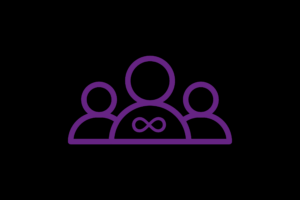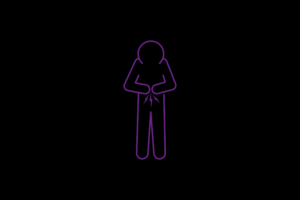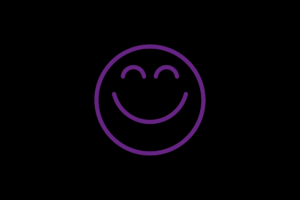The magic formula for sleep is high levels of melatonin and low levels of stress.
When it gets dark, our brains produce melatonin. This then makes us feel tired and gets us ready to sleep. Melatonin decreases when it is light, so we wake up in the morning. Because of this, our bodies usually follow a 24 hour cycle.
This is why people often say turning screens off at night is helpful – the light can trick the brain into thinking it isn’t time for sleep yet and stop melatonin from producing.
But sleep isn’t that simple! To be able to sleep, we need both high melatonin and low stress. For a lot of autistic people, high levels of stress is why sleep can be really hard. For example, a lot of us feel that our brains never stop thinking, so it can be hard to “switch off” when we need to.
This means that typical “sleep strategies” (focused on increasing melatonin) may not work, and we need to try things that are a compromise. Things that increase melatonin just enough, while also reducing stress enough to make sleep easier.
Here are some top tips/ things to try if you find it difficult to sleep:
Sensory Needs
- Make sure the bedroom is at a comfortable temperature.
- Keep your bedroom as dark as you can. If you need lights, try to use lights that aren’t very bright.
- You could try a sleep mask if you are comfortable with one.
- Whilst some people struggle with baths and showers, others may find this to be very relaxing before going to bed.
- Block out light using black-out curtains.
- Try to get rid of visual clutter – can things be tidied away?
- Try to limit household noises at bedtime. It may be helpful to use ear plugs, listen to music or use a white noise machine to block out other sounds.
Activities
- If you enjoy listening to music, apps like Spotify have a “sleep timer”, where the music turns off automatically after a set amount of time.
- If you need a screen at night time to relax, can you use “reading/night time mode” or install an app that blocks blue light? Smartphones and tablets have lots on the app store. On PC, there is software like f.lux. You can also just turn the brightness of screens and monitors down as it gets close to bedtime.
- Research shows that exercise during the day is a great way to improve sleep, as it gradually tires the body. Avoid exercise just before bedtime though, as it can make you feel more awake.
- Try to avoid drinking too much liquid in the evenings and avoid anything that contains caffeine such as coffee, cola drinks and energy drinks. It takes 5 hours for half the caffeine you have consumed to leave your body!
- Try not to eat too late in the evening. It is better to avoid a huge meal for at least 3 hours before bed, as your body will be digesting food, making sleep harder. If you do need food, consider a light, healthy snack instead.
- Are there any soothing activities you can do before bedtime, such as cuddling a pet?
Having a routine
- Try to go to bed at the same time each night and get up at the same time each morning – this can help to strengthen your sleep cycle.
- Unless you really need them, try to avoid naps during the daytime. Could you try just lying down and watching a video rather than napping?
- If you have a stressful day or are low on energy, it’s OK to not be able to complete your usual routine. Skipping getting changed, washing or other activities could make the routine easier on days that are a struggle. You can have a fresh start the next day.
- Sometimes, having a set, strict bedtime routine can be unhelpful. If you are mid way through a task, it can sometimes be better to finish this first to reduce stress.
- When we have had a stressful day, it can be really difficult to process everything that happened, so writing it down or talking through it with someone can be helpful, rather than overthinking things at bedtime.
- Making a plan for your next day can be helpful, as uncertainty about the next day can be a big cause of stress at bedtime
Things to remember
- Sleep routines can be very difficult to make and maintain, especially if you have a lot of stress in your life. If you are struggling to have a routine, this is OK. Sometimes, sleep is hard because life is hard, and having a good sleep routine may not help. This isn’t your fault.
- It is also OK if your routine is different to most people. Sleep routines are personal and can look different for everyone.
- Although getting plenty of sleep is ideal, we should try and remember that everyone struggles to sleep sometimes.
- Some people, when struggling to sleep, find it’s better to get up and do something for a while until they feel sleepy. If we’ve spent around 20 minutes in bed without being able to fall asleep, we should get out of bed and go do something relaxing, in low light.
- Before bed, we may feel the need to do activities which we are told won’t help with sleep. For example, playing a competitive game or talking with friends. However, sometimes this is simply the brain telling us it needs distraction because of a high level of stress. Rather than trying to stop doing these things, try and make slight adaptations instead.
- If you’re struggling with sleep a lot it might be worth speaking to a parent, guardian, trusted friend or your doctor. Doctors can sometimes give Melatonin as a medicine to help with falling asleep and staying asleep.
Useful apps and products recommended by young people
- F.lux – blue light software for PC
- Spotify – Spotify has a sleep timer, so you can listen to music or podcasts for a set amount of time, before they stop playing.
- Audible – You can listen to audiobooks and set a “bookmarker” for when the book stops for the night.
- Headspace is a science-backed app in mindfulness and meditation, providing unique tools and resources to help reduce stress, build resilience, and aid better sleep. You can try Headspace for yourself and learn the essentials of meditation and mindfulness with their free basics course. If you enjoy it, you can subscribe. Headspace is available on iOS and Android.
- Pzizz is an NHS recommended app that helps you quickly calm your mind, fall asleep fast, stay asleep, and wake up refreshed. It uses “dreamscapes” – a mix of music, voiceovers and sound effects designed using the latest clinical research – to help you sleep better at night or take power naps during the day. Pzizz is available on iOS and Android.
- Free Calm Sleep: Improve your Sleep for Free, is a free app available for Androids. It uses relaxing sleep sounds and ambiences that can be used to help improve your sleep.
- Calm is an app for meditation and sleep. It uses sleep stories, breathing programs, masterclasses, and relaxing music. Calm is a mindfulness app for beginners, but also includes hundreds of programs for intermediate and advanced users. Guided meditation sessions are available in lengths of 3-25 minutes so you can choose the length to fit with your schedule. Calm is available on iOS and Android.
- Sleep Sounds – Sleep melodies & Calming sounds, free sleep app. It uses sleeping sounds, nature sounds, rain sounds, meditation sounds, white noise and much more. This app is available on Android.
- A Soft Murmur – Mix and generate relaxing sounds, such as Rain, bird chirping, white noise, etc. You can share your mixes and set timers to start and stop the sounds to your routine. An offline app is available on Google Play and the Apple App Store.
A collaboration between:
-
Steve Williams, Autistic Adult
-
Andy Smith, Founder of Spectrum Gaming
-
Young people from Spectrum Gaming



